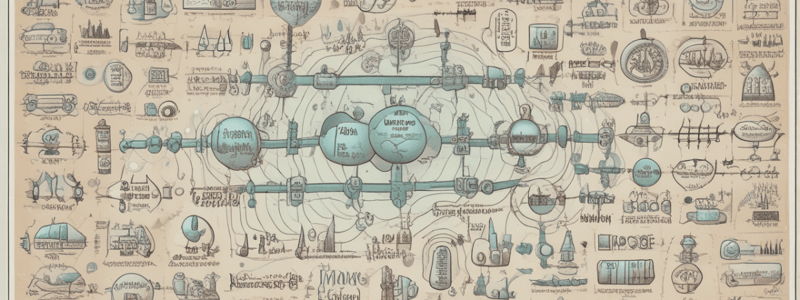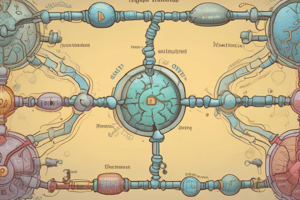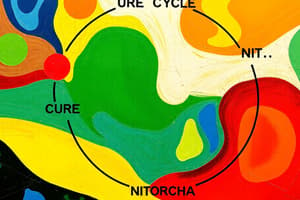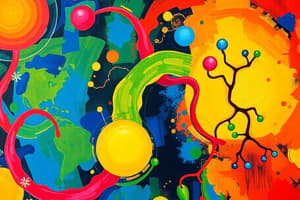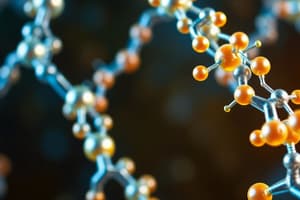Podcast
Questions and Answers
Which amino acid plays a key role in removing toxic ammonia from muscles?
Which amino acid plays a key role in removing toxic ammonia from muscles?
- Glutamine
- Folate
- Pyridoxine
- Alanine (correct)
What is the pathway that operates when NH4+ levels are high?
What is the pathway that operates when NH4+ levels are high?
- Carbamoyl phosphate synthetase
- Glutamate dehydrogenase/glutamine synthetase (correct)
- Glutamate synthase/glutamine synthetase
- Asparagine synthetase
What is the name of the coenzyme form of Vitamin B6?
What is the name of the coenzyme form of Vitamin B6?
- Folic acid
- Pyridoxamine
- Pyridoxal
- Pyridoxal phosphate (correct)
What is the role of glutamine synthetase and glutaminase in most tissues?
What is the role of glutamine synthetase and glutaminase in most tissues?
What is the primary function of asparagine synthetase?
What is the primary function of asparagine synthetase?
What is the characteristic of folate coenzymes that helps them be retained within cells?
What is the characteristic of folate coenzymes that helps them be retained within cells?
What is the first step in the final route for assimilating ammonia?
What is the first step in the final route for assimilating ammonia?
What is the target of a number of useful anticancer, antibacterial, and antiparasitic drugs?
What is the target of a number of useful anticancer, antibacterial, and antiparasitic drugs?
What is the role of pyridoxal phosphate in transamination?
What is the role of pyridoxal phosphate in transamination?
What is the initial step in all pyridoxal phosphate reactions?
What is the initial step in all pyridoxal phosphate reactions?
What is the functional group attached to the pyridine ring in pyridoxal phosphate?
What is the functional group attached to the pyridine ring in pyridoxal phosphate?
What is the role of the glucose-alanine cycle in muscles?
What is the role of the glucose-alanine cycle in muscles?
What is the intermediate formed during the catalytic cycle of aminotransferases?
What is the intermediate formed during the catalytic cycle of aminotransferases?
What is the intermediate form of pyridoxal phosphate in transamination reactions?
What is the intermediate form of pyridoxal phosphate in transamination reactions?
What is the vitamin from which pyridoxal phosphate is derived?
What is the vitamin from which pyridoxal phosphate is derived?
When do levels of NH4+ trigger the glutamate synthase/glutamine synthetase pathway?
When do levels of NH4+ trigger the glutamate synthase/glutamine synthetase pathway?
What is a possible consequence of a genetic defect in methionine synthase?
What is a possible consequence of a genetic defect in methionine synthase?
Which of the following vitamins is required for the prevention of homocysteinemia?
Which of the following vitamins is required for the prevention of homocysteinemia?
What is the role of polyamines in cell proliferation?
What is the role of polyamines in cell proliferation?
What is the neurotransmitter synthesized from glutamate through decarboxylation?
What is the neurotransmitter synthesized from glutamate through decarboxylation?
What is the intermediate formed in the synthesis of nitric oxide from arginine?
What is the intermediate formed in the synthesis of nitric oxide from arginine?
What is the result of iodine deficiency in the biosynthesis of thyroid hormones?
What is the result of iodine deficiency in the biosynthesis of thyroid hormones?
What is the source of thyroid hormones in the body?
What is the source of thyroid hormones in the body?
What is the fate of the iodinated forms of tyrosine in the biosynthesis of thyroid hormones?
What is the fate of the iodinated forms of tyrosine in the biosynthesis of thyroid hormones?
What is the result of the breakdown of heme proteins in animals?
What is the result of the breakdown of heme proteins in animals?
Which of the following amino acids serves as a precursor to neurotransmitters?
Which of the following amino acids serves as a precursor to neurotransmitters?
What is the enzyme involved in the hydroxylation of tryptophan to produce serotonin?
What is the enzyme involved in the hydroxylation of tryptophan to produce serotonin?
What is the mechanism involved in the reaction of aromatic amino acid hydroxylases?
What is the mechanism involved in the reaction of aromatic amino acid hydroxylases?
What is the result of the abnormal accumulation of heme precursors in porphyrias?
What is the result of the abnormal accumulation of heme precursors in porphyrias?
What is the source of most of the heme that is catabolized?
What is the source of most of the heme that is catabolized?
What is the enzyme involved in the decarboxylation of tryptophan to produce serotonin?
What is the enzyme involved in the decarboxylation of tryptophan to produce serotonin?
What is the structural relationship between tryptophan hydroxylase and phenylalanine hydroxylase?
What is the structural relationship between tryptophan hydroxylase and phenylalanine hydroxylase?
What is the consequence of a deficiency of vitamin B12 on folate coenzymes?
What is the consequence of a deficiency of vitamin B12 on folate coenzymes?
What is the relationship between folate and B12 metabolism?
What is the relationship between folate and B12 metabolism?
What is the product of the hydrolytic cleavage of asparagine by asparaginase?
What is the product of the hydrolytic cleavage of asparagine by asparaginase?
What is the outcome of the transamination of aspartate by aspartate transaminase?
What is the outcome of the transamination of aspartate by aspartate transaminase?
Which of the following amino acids is degraded to succinyl-CoA?
Which of the following amino acids is degraded to succinyl-CoA?
What is the role of hydrogen sulfide in the body?
What is the role of hydrogen sulfide in the body?
What is the consequence of folic acid deficiency?
What is the consequence of folic acid deficiency?
What is the cause of pernicious anemia?
What is the cause of pernicious anemia?
Flashcards are hidden until you start studying
Study Notes
Biogenesis of Organic Nitrogen
- When NH4+ levels are high, the glutamate dehydrogenase/glutamine synthetase pathway operates.
- When NH4+ levels are low, the glutamate synthase/glutamine synthetase pathway predominates.
- Asparagine synthetase catalyzes a reaction comparable to that of glutamine synthetase, using ammonia or glutamine to convert aspartate to asparagine.
- The final route for assimilating ammonia first forms carbamoyl phosphate, which is catalyzed by carbamoyl phosphate synthetase, using either ammonia or glutamine as the nitrogen donor.
The Nitrogen Economy
- Transamination is the reversible transfer of an amino group from an α-amino acid to an α-keto acid, with pyridoxal phosphate as a coenzyme.
- Aminotransferases utilize a coenzyme, pyridoxal phosphate, derived from vitamin B6, which has an aldehyde functional group, CHO, attached to a pyridine ring.
- The catalytic cycle begins with condensation of this aldehyde with the α-amino group of an amino acid, to give a Schiff base, or aldimine, intermediate.
- The carrier is glutamine in most tissues, except for muscles, where this role is played by alanine.
Amino Acid Degradation and Metabolism of Nitrogenous End Products
- The glucose–alanine cycle removes toxic ammonia from muscle.
- Glutamine synthetase and glutaminase do the same for most other tissues.
Coenzymes Involved in Nitrogen Metabolism
- Vitamin B6 is also called pyridoxine, and its active coenzyme form is pyridoxal phosphate (PLP), which is oxidized to an aldehyde and has a phosphorylated hydroxymethyl group at position 5.
- Pyridoxamine phosphate (PMP) is an intermediate form in transamination reactions.
- All pyridoxal phosphate reactions involve initial Schiff base formation, followed by bond labilization caused by electron withdrawal to the coenzyme’s pyridine ring.
- Folate coenzymes contain multiple glutamate residues, which help them be retained within cells and bind more tightly to enzymes.
- Dihydrofolate reductase is the target for a number of useful anticancer, antibacterial, and antiparasitic drugs.
Pathways of Amino Acid Degradation
- Glucogenic amino acids are degraded to one of five intermediates: pyruvate, α-ketoglutarate, succinyl-CoA, fumarate, or oxaloacetate.
- Ketogenic amino acids are degraded to acetyl-CoA or acetoacetate.
- Some amino acids are both glucogenic and ketogenic.
- Hydrogen sulfide (H2S), derived from cysteine, is a powerful gaseous signaling molecule involved in the regulation of vascular blood flow and blood pressure.
Amino Acids as Biosynthetic Precursors
- Homocysteinemia can result from genetic defects in cystathionine β-synthase, methionine synthase, or 5,10-methylenetetrahydrofolate reductase, or from dietary deficiency of folic acid, vitamin B6, or vitamin B12.
- Polyamines are required for cell proliferation because of their roles in stabilizing duplex DNA structures.
- Glutamate is a precursor for compounds that function in transmission of nerve impulses, and its decarboxylation yields γ-aminobutyric acid (GABA), which is a neurotransmitter.
- Arginine is a precursor for nitric oxide and creatine phosphate.
Porphyrin and Heme Metabolism
- Heme protein degradation in animals releases amino acids and iron, which are reused, and bilirubin, which must be solubilized for excretion.
- Porphyrias involve abnormal accumulations of heme precursors, either from overproduction of the unnatural type I porphyrins or from abnormally high flux through δ-ALA synthetase.
Amino Acids and Their Metabolites as Neurotransmitters and Biological Regulators
- Glutamate, tyrosine, glycine, and tryptophan serve as neurotransmitters or precursors to neurotransmitters.
- The pathway to serotonin begins with hydroxylation of tryptophan by a tetrahydrobiopterin-dependent aromatic amino acid hydroxylase, similar to phenylalanine hydroxylase.
- Tryptophan hydroxylase and tyrosine hydroxylase are both tetrahydrobiopterin-dependent monooxygenases and are mechanistically and structurally related to phenylalanine hydroxylase.
Studying That Suits You
Use AI to generate personalized quizzes and flashcards to suit your learning preferences.
